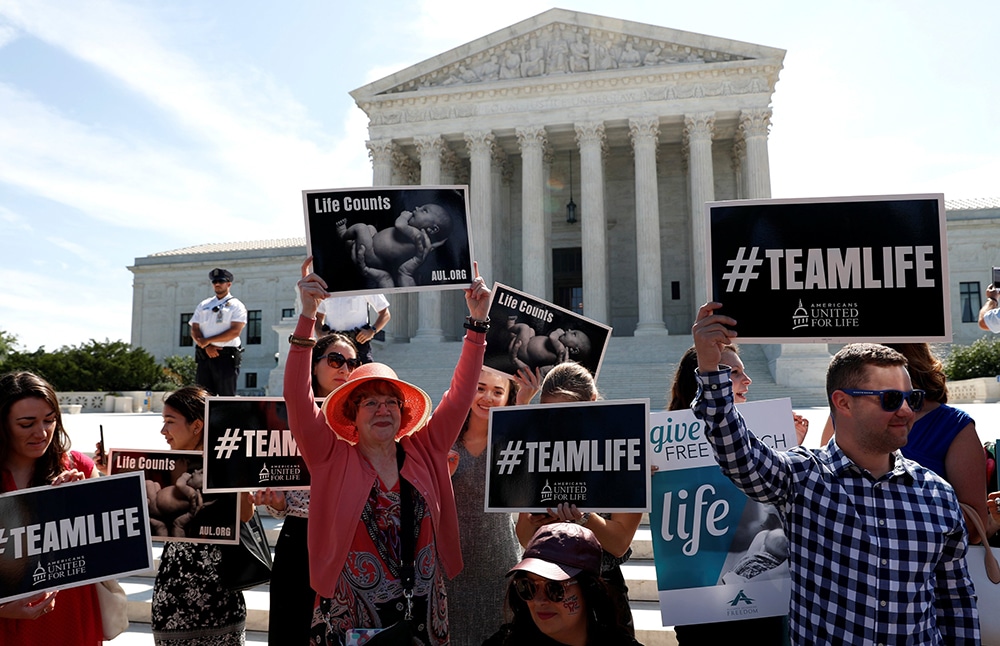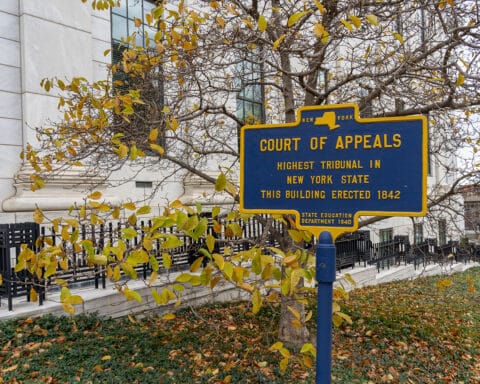What would life look like if Roe v. Wade were overturned?
The U.S. Supreme Court recently announced that it will hear a case this fall concerning a Mississippi law banning most abortions after 15 weeks’ gestation. For the first time since 1992, when three Republican-appointed Supreme Court justices (led by Justice Anthony Kennedy, a Catholic) saved Roe in a jointly written opinion in Planned Parenthood v. Casey, the future of Roe is in doubt.
The last time we were in a similar situation was in 1989. In the wake of the U.S. Supreme Court’s decision in Webster v. Reproductive Health Services in April of that year, it was widely expected that the court would revisit Roe itself in Turnock v. Ragsdale, a case out of Illinois that was scheduled to be heard in December. But quiet lobbying by the Republican administration of George H.W. Bush, combined with the gubernatorial ambitions of Illinois Attorney General Neil Hartigan, the Catholic Democrat who had pursued the case all the way to the Supreme Court, led to a negotiated settlement with Richard Ragsdale (a man who personally performed 60,000 abortions in his lifetime) that kept the case from being heard. President Bush’s appointment of “stealth justice” David Souter the next July changed the composition of the court, setting the stage for the Casey decision two years later and nearly 30 years of deadlock on abortion at the national level.
The appointment of three Supreme Court justices by President Donald Trump has changed the balance of the court once again, but until we hear the questions those justices might ask during Dobbs v. Jackson Women’s Health Organization this fall, it’s too early to predict whether Roe will stand or fall, or even be addressed directly in the court’s decision. Nearly 50 years in, so much of American jurisprudence (and not just on abortion) has been built on Roe that even a majority that may doubt that the U.S. Constitution guarantees a right to an abortion might choose to trim off some of the more unsightly branches rather than to strike at the root of a deadly tree.
Such an approach would be a mistake. The U.S. Supreme Court should overturn Roe v. Wade once and for all.
Were the court to do so, the immediate result would be something other than what most supporters or opponents of abortion expect. Roe established a national right to an abortion; if the court were to overturn Roe, that question would return to each state. In some states, abortions will almost certainly rise, as laws guaranteeing abortion up until the last days of pregnancy are passed, and organizations such as Planned Parenthood step in to take advantage of new opportunities. In other states, abortion will be essentially outlawed or restricted to the earliest days of pregnancy, but such laws will immediately be challenged and not go into effect unless and until they survive trial in the courts.
More interesting will be the 30 or so states that fall somewhere in the middle. That’s where the real opportunities to break the decadeslong national stalemate on abortion, and to make true progress toward building a culture of life, will be found.
It should go without saying (though, sadly, it hasn’t for many years) that all Catholics should work toward a future in which every child who is conceived will be born, and born into a community that will love and embrace him or her, not just at the moment of birth but throughout his or her life. The overturning of Roe v. Wade would put all of us in the position of those who volunteer today at pregnancy care centers, forcing each of us to focus on the reality of abortion in our own backyard, where the mothers contemplating abortion and the children in danger of losing their lives are not political abstractions but real people.
Monsignor Luigi Guissani, the founder of Communion and Liberation, once described the life of the Church, animated by Christian charity, as a society in which, “for example, the birth of a baby is truly an occasion of joy for all. Of course it is joyful for the two members of the community united in marriage who are the parents, but the birth is also a reason for everyone to celebrate. In this kind of society, sick people are cared for and the eviction of a family creates a responsibility that falls upon the entire community; this happens to the degree that it is possible and that everyone’s rights are respected.”
Significantly, Monsignor Guissani concluded, “I am not merely speaking about an ideal here. I am speaking about things that, in a Christian community, are simply done if it is a true Christian community.”
What would life look like if Roe v. Wade were overturned? Why wait to find out? Everything that we could do then, we can start doing now. Then, no matter what the Supreme Court does concerning Roe v. Wade, we will have a head start on building a true culture of life.
Our Sunday Visitor Editorial Board: Gretchen R. Crowe, Scott P. Richert, Scott Warden, York Young





